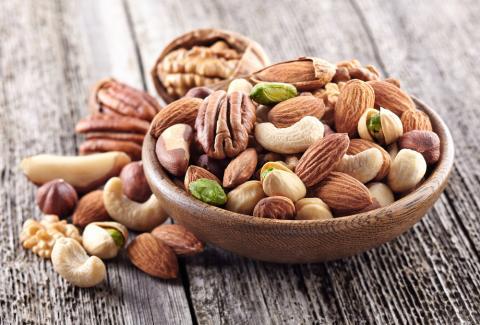
From peanuts to cashews, the bar to the baseball stadium, nuts are just delicious! But sadly, nuts have gotten kind of a bad rap. Many people avoid eating too many nuts, believing them high in calories and fats.
But while nuts may contain fats, they're the good kind that your body needs. And nuts offer so much more for your overall health—you really should be including more of them in your diet. Ever wonder why a walnut looks just like your brain? Read on!
Health Benefits of Nuts
Nuts offer a veritable plethora of health benefits. Nuts have been shown to significantly lower your cholesterol and improve your heart health. In addition, eating nuts lowers your risk of developing Type II diabetes. Walnuts are particularly good for lowering Type II diabetes risk. A study recently performed by Harvard University showed that women who ate just seven almonds per day reduced their risk of developing Type II diabetes by 24%.
In addition, nuts are amazing for heart health. While it is true that nuts are high in fats, they are the healthy, unsaturated fats your circulatory system craves. Some studies have even connected increased consumption of nuts with a lower risk of breast cancer. This is because the nutrition found in nuts helps to lower acidity in the body. Too much acidity has been linked to a higher cancer risk.
Different Nuts for Different Reasons
While all nuts offer heart health benefits, different types of nuts offer more specialized health benefits. For example, Brazil nuts contain a very high level of selenium, a mineral that helps raise your metabolism. They are also high in antioxidants, and this quality can add a healthy glow to your skin.
Cashews are a godsend for eye health. They contain high levels of lutein, a critical antioxidant that can help combat the macular degeneration that can come with normal aging. Lutein may also help those who spend a large amount of time in the sun, as these antioxidants assist in blocking the damaging effects of UV radiation.
Almonds are particularly high in vitamins E and D. Vitamin D is a critical vitamin for many Americans, especially those in northern latitudes who may not get much daily exposure to the sun. Vitamin D is helpful in lowering high blood pressures in hypertensive individuals. Vitamin D can also increase physical endurance and stave off feelings of hunger for longer periods of time.
Don't Forget Seeds, Too!
While we've been discussing nuts, it's important not to overlook seeds as another valuable nutritional firearm. Eating chia seeds, for example, may help you lose weight. This is because they lower the markers found in diabetics which can lead to weight gain. In addition, the nutrition found in chia seeds helps you to feel sated longer after eating.
Flaxseeds are also nutritional powerhouses and can help you to not only lose weight but to improve your overall heart health. Flax seeds have proven beneficial in removing plaque from blocked arteries which can lead to heart attacks. Flax seeds also help to lower your LDL, or "bad" cholesterol and keep it at normal levels. Just a spoonful on your regular morning cereal can work wonders for your overall health.
In addition, a lesser known seed, Sachi Inchi seeds additionally lower cholesterol and high blood pressure. With a mild, nutty taste similar to that of deeply roasted peanuts, Sachi Inchi seeds make a natural addition to many traditional Thai dishes as well as enjoyed on their own as a snack.
If you're seeking to lose weight, improve your heart and cardiovascular health, improve your brain and eye health as well as give your skin that nice, rosy glow, you'd do well to go a bit nutty! By adding just one serving of nuts to your everyday diet, you'll be well on your way to a happier and healthier you. Get cracking!








